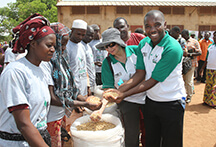PICS bags aided farmers in Ebola-stricken Sierra Leone
November 17, 2015
 |
|
Purdue entomologist Dieudonné Baributsa inspects a Purdue Improved Crop Storage bag during a trip to Burkina Faso in May. He is one of two Purdue faculty members involved in a project to help farmers in Sierra Leone store their seed safely during the Ebola health emergency. (Purdue Agricultural Communication photo/Tom Campbell) |
WEST LAFAYETTE, Ind. - The triple-bag technology created at Purdue University to help African smallholder farmers store their crops after harvest also enabled farmers in Sierra Leone to protect their seeds when the Ebola outbreak disrupted agricultural markets.
Purdue Improved Crop Storage, known as PICS, was designed specifically for farmers in West and Central Africa to store cowpea - known in the United States as black-eyed pea - in hermetic triple layers of plastic bags for long periods after harvest so they could sell them when market prices increase months later. Without the bags, the farmers had to use often-ineffective insecticides or sell their crops immediately after harvest when crop prices are lower.
Two Purdue faculty members this year were part of an effort that extended use of the PICS bags to storing seeds during a time when neither seeds nor grain could be easily stored or sold because of the Ebola outbreak.
“Some districts were under 100 percent quarantine; the markets were disrupted,” noted Dieudonné Baributsa, an entomology research assistant professor who led the project at Purdue in partnership with Catholic Relief Services. The project involved developing a program to train farmers on how to use the bags for storing seed for planting later and also to store their grain for home consumption.
Some 10,000 PICS bags were imported into Sierra Leone for the project. About 3,700 farmers received bags and were trained as a result of a grant from Catholic Relief Services. The Purdue faculty and CRS staff members implemented training programs for Extension agents and personnel of nongovernmental organizations.
Training was conducted in small groups because of a ban on large gatherings when Sierra Leone was in its health emergency. Community awareness of the bags and training was raised in part through radio programs and advertisements. Mobile phone videos were also used for training and to increase use of the bags in remote communities.
“As a result, farmers now are using the bags more and more to store their seed,” Baributsa said.
The bags are helping farmers in Sierra Leone protect their food and seed and to think more about the future as the country recovers from the Ebola outbreak, said Corinne Alexander, a Purdue agricultural economist who also was involved in the project. The World Health Organization earlier this month declared Sierra Leone free of Ebola.
The PICS bags put farmers in charge in responding to disaster, said Louise Sperling of Catholic Relief Services.
“Rather than bring in outside seed aid after the fact, the bags are preventative and help farmers save the seed they really trust,” she said.
A key finding was that seeds, primarily rice, maintained a high level of germination when stored in the bags.
“So it turns out the PICS bags are very effective for storing seed,” Sperling said.
The triple bagging - a chemical-free storage method developed by Larry Murdock, distinguished professor of entomology, allows farmers to store a variety of major crops for more than a year after harvest. The technology helps improve food availability year-round and increase income of smallholder farmers.
After efforts under the initial PICS program, begun in 2007, focused on using the technology to store cowpea, a second phase involved research into how the bags could be used to store other crops such as maize. A third phase, developed in 2014, moved the PICS bags from research and applications for only one crop to commercialization involving multiple crops.
Writer: Keith Robinson, 765-494-2722, robins89@purdue.edu
Sources: Dieudonné Baributsa, 765-494-8713, dbaribut@purdue.edu
Corinne Alexander, 765-494-4249, cealexan@purdue.edu
Louise Sperling, 860-488-1938, louise.sperling@crs.org
Ag Communications: (765) 494-2722;
Keith Robinson, robins89@purdue.edu
Agriculture News Page

